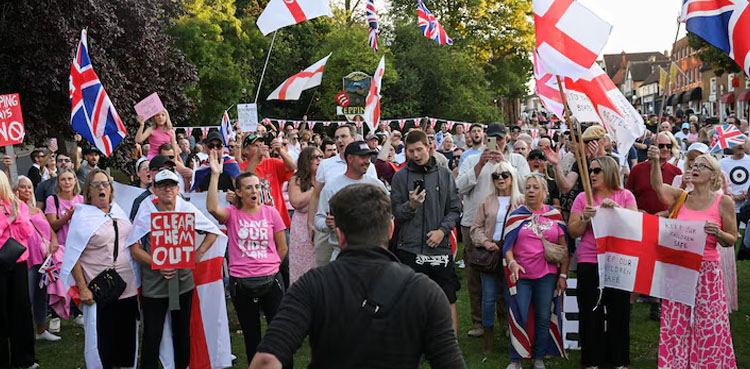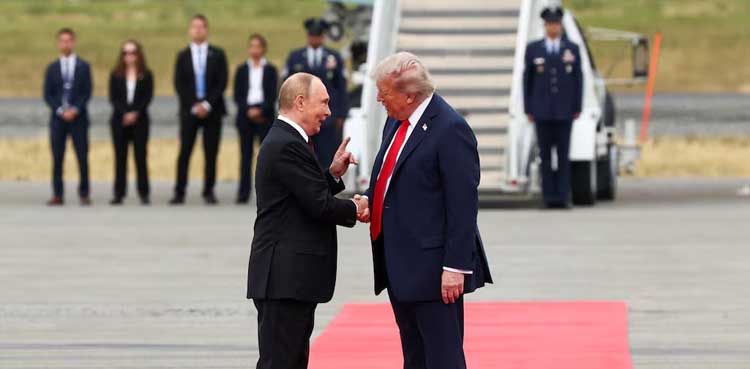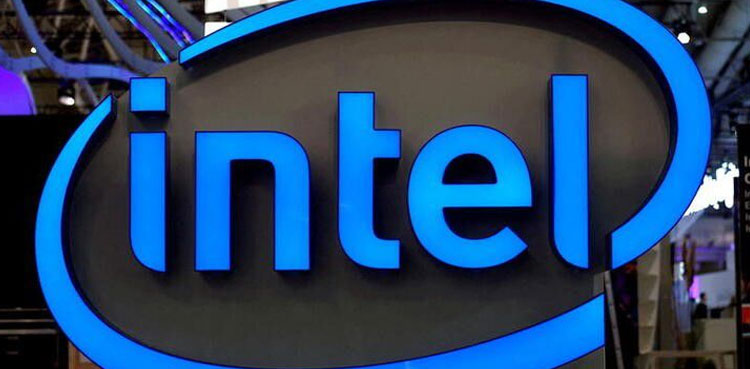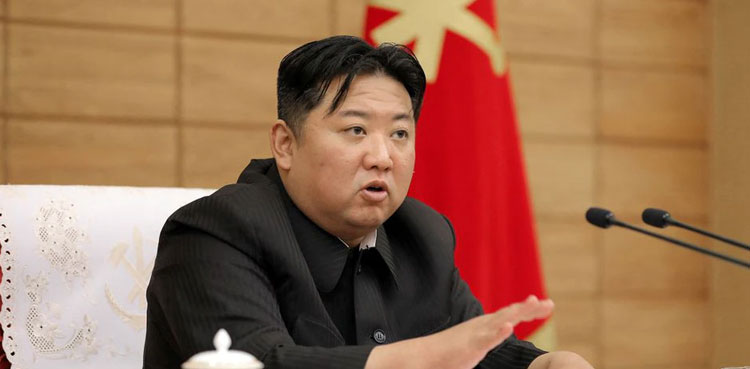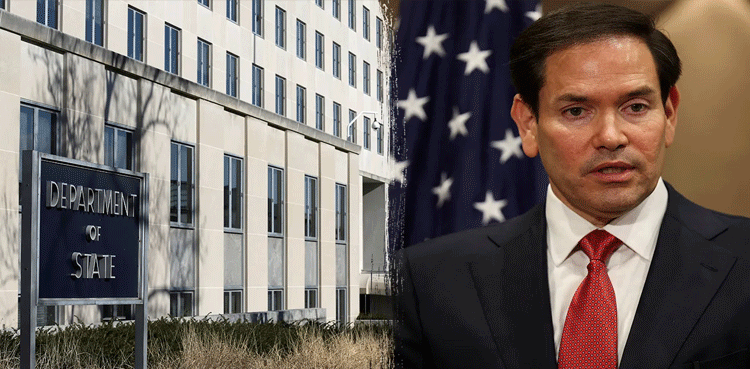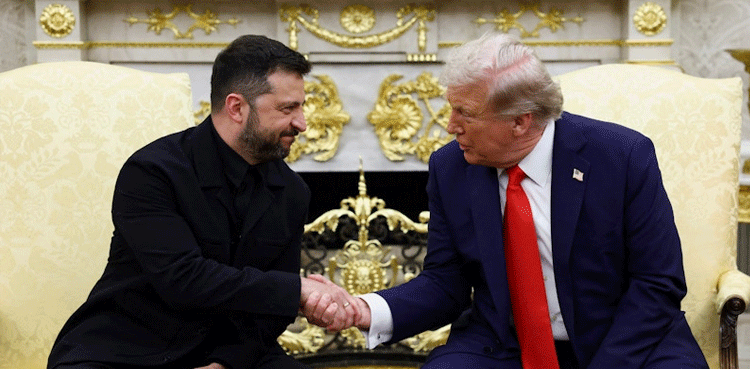WASHINGTON: U.S. President Donald Trump said on Monday that the United States would “help out” Europe in providing security for Ukraine as part of any deal to end Russia’s war in Ukraine, as he and President Volodymyr Zelenskiy began a hastily arranged White House meeting to discuss a path to peace.
Speaking to reporters in the Oval Office with Zelenskiy seated beside him, Trump also expressed hope that Monday’s summit could eventually lead to a trilateral meeting with Russian President Vladimir Putin, adding that he believes Putin wants the war to end.
Zelenskiy and a group of European leaders arrived in Washington facing increased pressure from Trump to reach a resolution to end the war on terms more favorable to Moscow, after Trump and Putin met in Alaska on Friday for nearly three hours.
“We need to stop this war, to stop Russia and we need support – American and European partners,” Zelenskiy told reporters.
Trump greeted Zelenskiy outside the White House, shaking his hand and expressing delight at Zelenskiy’s black suit, a departure from his typical military clothes. When a reporter asked Trump what his message was to the people of Ukraine, he said twice, “We love them.”
Zelenskiy thanked him, and Trump put his hand on Zelenskiy’s back in a show of affection before the two men went inside to the Oval Office, where their last meeting in February ended in disaster after Trump dressed Zelenskiy down in front of television cameras.
This time, the leaders of Britain, Germany, France, Italy, Finland, the European Union and NATO joined Zelenskiy to demonstrate solidarity with Ukraine and push for strong security guarantees in any post-war settlement.
Trump is pressing for a quick end to Europe’s deadliest war in 80 years, and Kyiv and its allies worry he could seek to force an agreement on Russia’s terms after the president on Friday in Alaska rolled out the red carpet – literally – for Putin, who faces an arrest warrant from the International Criminal Court for war crimes.
The European leaders will meet with Trump afterwards in the White House’s East Room at 3 p.m. EDT (1900 GMT), according to the White House. Such a high-level gathering at the White House on such short notice appears to be unprecedented in recent times.
Russian attacks overnight on Ukrainian cities killed at least 10 people, in what Zelenskiy called a “cynical” effort to undermine talks.
Trump has rejected accusations that the Alaska summit had been a win for Putin, who has faced diplomatic isolation since Russia’s invasion of Ukraine in 2022.
“I know exactly what I’m doing, and I don’t need the advice of people who have been working on all of these conflicts for years, and were never able to do a thing to stop them,” Trump wrote on social media.
Trump’s team has said there will have to be compromises on both sides to end the conflict. But the president himself has put the burden on Zelenskiy to end the war, saying Ukraine should give up hopes of getting back Crimea, annexed by Russia in 2014, or of joining the NATO military alliance.
Zelenskiy “can end the war with Russia almost immediately, if he wants to, or he can continue to fight,” Trump said on social media.
PUTIN’S PROPOSALS
Zelenskiy has already all but rejected the outline of Putin’s proposals from the Alaska meeting. Those include handing over the remaining quarter of its eastern Donetsk region, which is largely controlled by Russia. Ukrainian forces are deeply dug into the region, whose towns and hills serve as a crucial defensive zone to stymie Russian attacks.
Any concession of Ukrainian territory would have to be approved by a referendum.
Zelenskiy is also seeking an immediate ceasefire to conduct deeper peace talks, a position that his European allies have also backed. Trump previously favored that idea but reversed course after the summit with Putin, instead indicating support for Russia’s preference to negotiate a comprehensive deal while fighting rumbles on.
Ukraine and its allies have taken heart from some developments, including Trump’s apparent willingness to provide post-settlement security guarantees for Ukraine. A German government spokesperson said on Monday that European leaders would seek more details on that in the talks in Washington.
The war, which began with a full-scale invasion by Russia in February 2022, has killed or wounded more than a million people from both sides, including thousands of mostly Ukrainian civilians, according to analysts, and destroyed wide swaths of the country.
Russia has been slowly grinding forward on the battlefield, pressing its advantages in men and firepower. Putin says he is ready to continue fighting until his military objectives are achieved.
Officials in Ukraine said a drone attack on a residential complex in the northern city of Kharkiv killed at least seven people, including a toddler and her 16-year-old brother. Strikes in the southeastern city of Zaporizhzhia killed three people, they said.
Russia says it does not deliberately target civilians, and the Defense Ministry’s daily report did not refer to any strike on Kharkiv.
Local resident Olena Yakusheva said the attack hit an apartment block that was home to many families. “There are no offices here or anything else, we lived here peacefully in our homes,” she said.
Ukraine’s military said on Monday that its drones had struck an oil pumping station in Russia’s Tambov region, leading to the suspension of supplies via the Druzhba pipeline.
